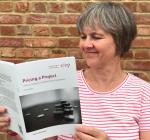The wise owls are soaring into summer with some reflections on the best continuous professional development (CPD) they have undertaken.
 Melanie Thompson
Melanie Thompson
About 25 years ago my employer sent me on a three-day training course called ‘Selling for non-sales staff’ (or some such title). The underlying ethos of the course was that people buy from people and that it’s best to engage potential clients in conversations to try to find out their aims and needs rather than to deluge them with a list of your (your company’s/product’s) ‘features and benefits’. It all seems rather obvious, once you pause to think of it, and it’s something I’ve tried to remember ever since.
But I learned a much more important lesson during the role play (two words that fill many freelancers with dread); namely that it’s important to ask open questions. At that point, with only a few years’ work experience under my belt I’d never even heard of the concept of ‘open’ and ‘closed’ questions. That was one of the most valuable lessons I have ever been given – of benefit for both business and personal interactions.
 Sue Littleford
Sue Littleford
I’ve done plenty of CPD as a copy-editor, but the best was probably a one-day business finance course I did yonks ago. From that course I picked up two nuggets, both of which I’m apt to trot out at the least provocation: (1) it’s easier to save money than to make money (as I said last time) and (2) cashflow is even more important than profit.
Cashflow is simply having enough money coming in to cover your commitments: enough to pay your mortgage or rent, fuel and power, tax bill and internet connection, and still put food on the table. But freelancing doesn’t lend itself particularly easily to smooth cashflow. This is why budgeting is so important – you need to understand how much money you need to make and when your invoices are likely to be paid, follow up late payment quickly and often, and price your work correctly. It’s also vital to do all you can to build up a cushion to tide you over the lean months. With many business clients paying on a 30-, 45- or even 60-day cycle, you can find yourself with loads of cash one month and almost nothing the next, even if you’ve been working steadily. Calculate what you need and make it a priority to save enough in the bank so that you can still pay your bills – and replenish what you spend. Then squirrel away a bit more to help you should a client suddenly go bust. After that, you can go and whoop it up in the fat months!
 Liz Jones
Liz Jones
I’ve undertaken plenty of CPD in the decade I’ve been freelance, including attending various SfEP courses and five conferences. They’ve all helped me a lot in terms of teaching me new things, giving me more confidence to run my business, and helping me access a wonderful international community of editorial professionals. Perhaps the thing that has been best for my own learning, though, has been teaching other editors via the SfEP’s mentoring programme.
Helping others learn how to do things has compelled me to examine my own practice, and improve it. It’s been necessary for me to find out more about how to do things myself to be able to explain to others how to do them. I’ve been amazed by the high standard of many of the people I have mentored over the years, in copy-editing and proofreading – and inspired to up my game as a result.
 Nik Prowse
Nik Prowse
I was lucky when I started in publishing that I found an employer willing to train me, fresh from my PhD, in copy-editing and proofreading. Those classroom courses at Book House in London – three days of copy-editing and one of proofreading, run by the Publishing Training Centre – were the most valuable of my career as they set me up in what I was going to do, every day, working in-house. The experience I gained on the job after that had a firm bedrock on which it could be built. But is that CPD? I’d only just started so it was more like IPD – initial professional development.
But since being freelance it’s harder to point to any one day or piece of CPD and say ‘yes, that’s the best bit’ because CPD builds you incrementally into the publishing professional you are at any point. Once you have done the basic training the continuation and building of a career is less about huge leaps in knowledge and more about little nuggets of information and wisdom that change one’s practice and allow you to make small improvements in the services that you provide. On reflection, in recent years my most inspiring piece of CPD in terms of the renewed enthusiasm that it gave me was the SfEP’s Education Day in London in early 2018. It featured a day of speakers who weren’t so much teaching as giving a state of the industry, a snapshot of the state of affairs for editors. After that event I wanted to improve the service I give to educational publishers, as it’s an aspect of my work that I hugely enjoy but which is also challenging too, at times. That day was less about learning something new and more about garnering a new resolve for the work that I do.
 Margaret Hunter
Margaret Hunter
The best CPD I’ve ever done is undoubtedly all the opportunities I’ve had for learning on the job. I love how pondering the different writing styles (and quirks) of different authors makes me question my assumptions. If something’s not written the way I would do it, is it wrong, or do I need to broaden my editorial horizons?
I’ve been editing for a long time but I still get stopped in my tracks and have to look things up, and I think that’s no bad thing. It also makes me think about how much (or how little) to change and how to let the author’s style through, rather than my own preferences. (But I do love a job where the author doesn’t care and is happy for me to preference away!)
Sometimes an author does something ‘odd’ so consistently that I begin to doubt myself, and often the more I look at it the more odd it looks! It’s a great opportunity to look up various style guides, consult the reference books or ask on the SfEP forum. It’s great revision, or it’s a great revelation. In any event, it’s great CPD.
L ouise Bolotin*
ouise Bolotin*
Back in 2001, I joined the editorial team at a large investment bank in the Netherlands where I worked on a huge range of equity analysis reports. I had only a lay knowledge of stocks, shares and the markets when I took the job. My boss sent me to London for a week to learn how to analyse and value a company. I didn’t quite manage to complete the final tasks on the last day – they required too much algebra, but I learned so much anyway. I’d never thought myself very numerate, despite being able to tot up Scrabble scores in my head and check a restaurant bill is correct. The course proved otherwise – I am. And I can read balance sheets, profit and loss accounts and more like a pro. I can skim a financial report and instantly understand the underlying issues. I can scan financial tables and errors leap out at me. Best of all, I gained confidence in my ability to handle figures. And while I still edit financial materials of all sorts, I can apply what I learned on the course to all kinds of other things I edit (annual reports a speciality). So thank you, Frans!
*Louise Bolotin died in October 2022; her contributions are much missed.
The SfEP’s parliament of wise owls started sharing wisdom and experiences back in 2016. All of the wise owls are Advanced Professional Members, with many years of experience and thousands of hours of CPD between them.
Proofread by Emma Easy, Entry-Level Member.
Posted by Abi Saffrey, SfEP blog coordinator.
The views expressed here do not necessarily reflect those of the SfEP.







